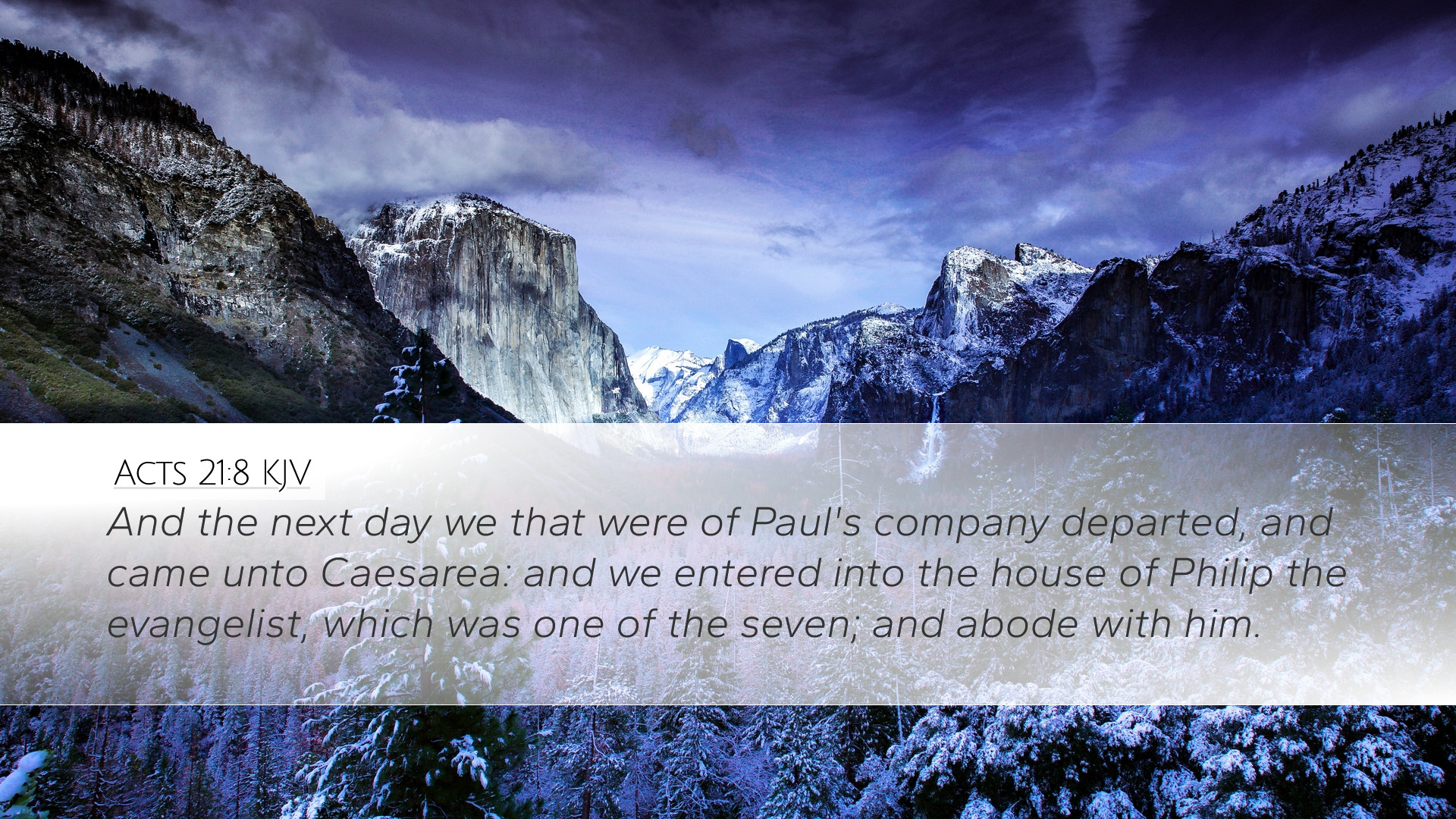Commentary on Acts 21:8
Acts 21:8 states: "And on the morrow we that were of Paul’s company departed, and came unto Caesarea: and we entered into the house of Philip the evangelist, which was one of the seven; and abode with him."
Contextual Overview
This verse captures a significant moment in the Apostle Paul's journey as he travels to Jerusalem. It is essential to gather insights into the implications of this visit, especially as Paul faces imminent challenges upon arrival.
Commentary Insights
Historical Context
Philip the Evangelist, mentioned in this verse, was one of the seven appointed to serve the church in Jerusalem (Acts 6:1-6). His role as one of the chosen deacons highlights the expansion of the church and the diversification of its leadership. The significance of visiting Philip's house is multi-fold, indicating not only hospitality but also the continuity of ministry from the days of the apostles.
Acts 21:8 in the Light of Matthew Henry’s Commentary
Henry emphasizes the importance of the company that Paul kept, suggesting that the journey represents the unity of believers in the mission field. Paul and his companions represent a collective of apostolic authority, evangelism, and faithfulness amidst trials.
- Unity in Ministry: The communal aspect of their journey signifies that the work of the Gospel transcends individual efforts, emphasizing the importance of collaboration in ministry.
- Philip’s Importance: Spending time with Philip the Evangelist showcases the necessity of mentorship and the passing of the baton in ministry roles.
- Preparation for Trials: The context establishes a sense of impending challenges as Paul approaches Jerusalem, cultivating a spirit of readiness among his companions.
Insights from Albert Barnes
Barnes focuses on the geographical and spiritual symbolism of Caesarea. He observes that Caesarea was a central location for early Christian missions. The choice to stay with Philip underscores the notion that evangelism blooms within strong community ties.
- A Strategic Location: Caesarea being a hub of activity signifies the strategic planning of the early Church in spreading the Gospel.
- Philip’s Witness: Philip’s previous encounters with God illustrate how personal testimonies can shape the evangelistic endeavors of new generations.
- Mentorship and Guidance: The relationship between Paul and Philip symbolizes the essential quality of discipleship, where experienced leaders guide emerging ones.
Words from Adam Clarke
Clarke adds depth by addressing the socio-political climate of the time and how it influenced the Church’s mission. He correlates the early Christian experiences with the broader Jewish tradition and the challenges faced post-Crucifixion.
- Hostility and Hope: The potential danger of returning to Jerusalem is contrasted with the hope offered by God’s promises and previous experiences, encouraging followers to trust in divine protection.
- The Role of Philip: Clarke amplifies the idea of Philip as not only a past evangelist but also a present source of wisdom for Paul as he prepares for confrontation in Jerusalem.
Theological Implications
This verse brings to light several theological implications that are crucial for pastors and theologians alike:
- Community and Fellowship: The importance of gathering among fellow believers is vital for sustenance in faith, particularly when facing trials. This highlights the ecclesiastical importance of collaboration within the Body of Christ.
- Providential Direction: Paul’s journey signifies the importance of following divine guidance. Understanding God's leading through the Holy Spirit is a crucial principle for all believers.
- Preparation for Ministry: Philip's presence serves as a reminder of the need for mentorship and preparation in the ministry, establishing relationships that foster spiritual growth.
Conclusion
Acts 21:8 encapsulates a moment of transition filled with historical, theological, and spiritual significance. The integration of insights from biblical commentaries enriches understanding of the verse, revealing layers of meaning related to church unity, mentorship, and the importance of faith amidst adversity.


